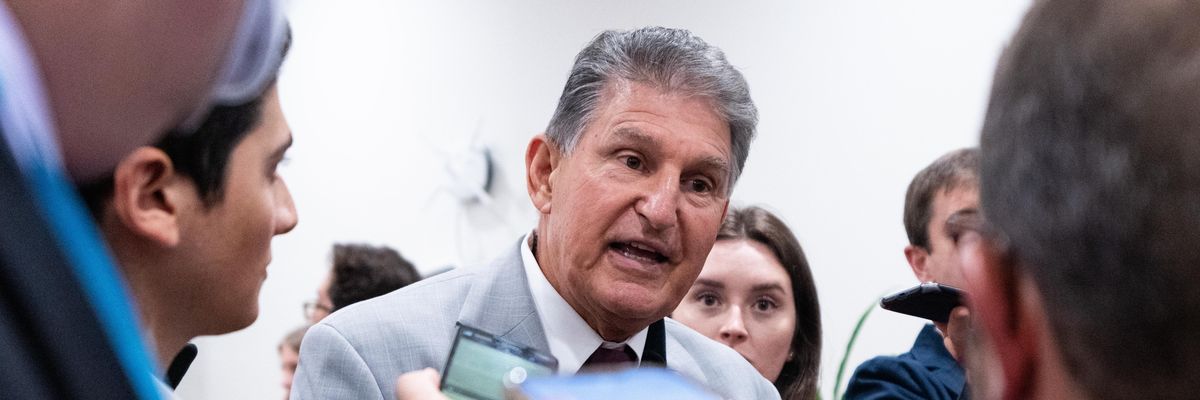Sen. Joe Manchin on Thursday responded dismissively to a reporter's question about the glaring conflict of interest posed by his family's ownership of a business that is profiting from coal waste—a toxic energy source that the West Virginia Democrat is actively promoting in the Senate.
"It's just our way of life, OK?" Manchin (D-W.Va.) toldE&E News climate reporter Adam Aton.
"I mean, I live in coal country, so if you don't work in coal country, you don’t work in West Virginia, usually," Manchin added.
The senator's comments came after he used a Senate Energy and Natural Resources Committee hearing to push Deputy Energy Secretary David Turk on why the Biden administration isn't devoting more federal resources toward expanding the use of coal waste, also known as gob—an acronym for "garbage of bituminous."
Manchin, who chairs the committee despite the myriad potential conflicts stemming from his close ties to the fossil fuel industry, accused the Biden administration of waging "war on coal."
"Will you all continue to support commercialization of innovative uses for coal, including both from newly-mined coal or from coal waste?" Manchin asked Turk during Thursday's hearing.
Turk responded by saying the energy agency has "been working as a department on this," pointing to "four smaller pilot projects out there" and adding that there are "plans to try to build from that."
E&E News noted that as chair of the Senate Energy and Natural Resources Committee, Manchin "has used his influence to add hundreds of millions of dollars for minerals research to bipartisan infrastructure legislation—with a focus on coal waste that has boosted the coal industry."
Manchin has insisted for years that he doesn't have any influence over his family business—which is called Enersystems and run by the senator's son—and that he has set up a blind trust for his company holdings.
Enersystems provides gob, a leftover of coal mining, to West Virginia's Grant Town power plant—the only power plant in the state that burns the substance.
The Washington Postreported in December 2021 that "documents filed by the senator show the blind trust is much too small to account for all his reported earnings from the coal company."
According to the Post, "Manchin’s latest financial disclosure report says that the West Virginia family coal business that he helped found and run, Enersystems, paid him $492,000 in interest, dividends and other income in 2020, and that his share of the firm is worth between $1 million and $5 million. He signed a sworn statement saying he is aware of these earnings, underscoring that he is not blind to them."
"If Manchin's coal interests are not in a blind trust, ethics experts said, it calls into question the impartiality of a senator who in October forced Biden to drop the plan in his Build Back Better bill to phase out the same kinds of coal plants that are key to his family company's profitability," the Post added.
Manchin has wasted no time in the new Congress working to advance the interests of the fossil fuel industry, which donated more to the West Virginia Democrat than any other member of Congress during the last election cycle.
As Common Dreams reported this week, Manchin has teamed up with Sen. Ted Cruz (R-Texas) on a bill to shield pollution-spewing gas stoves and joined Rep. Bruce Westerman (R-Ark.) in an effort to revive a fossil fuel-friendly permitting overhaul that the Senate repeatedly rejected last year.

